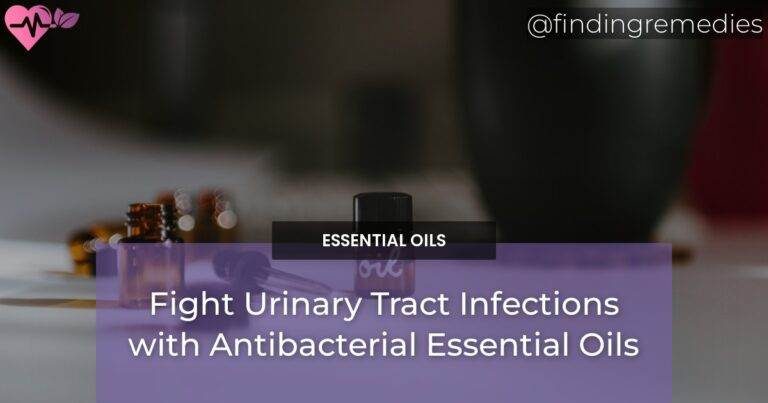Urinary tract infections (UTIs) can be painful and disruptive, but there are natural remedies that can help alleviate symptoms and promote healing.
One such remedy is the use of antibacterial essential oils for urinary tract infections. These oils have been found to possess antimicrobial properties that can effectively combat the bacteria responsible for UTIs. By incorporating essential oils into your treatment plan, you can potentially reduce the duration and severity of UTIs, and even prevent them from recurring.
Table of Contents
Symptoms and Causes of UTIs
Common Symptoms of UTIs
Before diving into the benefits of using essential oils for UTIs, it’s important to understand the symptoms that indicate the presence of an infection. Common signs of a UTI include:
- Frequent urge to urinate
- Burning sensation during urination
- Cloudy or strong-smelling urine
- Pain or discomfort in the lower abdomen
- Feeling tired or shaky
Causes of UTIs
UTIs are typically caused by bacteria, most commonly Escherichia coli (E. coli), entering the urethra and traveling up into the urinary tract. This can occur due to improper hygiene practices, sexual activity, or other factors that introduce bacteria into the urinary system.
ALSO READ
Risk Factors for UTIs
Several factors can increase the risk of developing a UTI, including:
- Female anatomy (shorter urethra)
- Sexual activity
- Menopause
- Pregnancy
- Diabetes
- Urinary tract abnormalities
- Weak immune system
Most Effective Essential Oils for UTIs
When it comes to fighting UTIs, certain essential oils have shown promising antibacterial properties. These oils can be used topically or inhaled to harness their therapeutic benefits. Here are some of the most effective essential oils for UTIs:
Tea Tree Oil
Tea tree oil is renowned for its antimicrobial properties and has been used for centuries to treat various infections. Its powerful compounds, such as terpinen-4-ol, can help inhibit the growth of bacteria responsible for UTIs.
ALSO READ
Oregano Oil
Oregano oil contains carvacrol and thymol, both of which possess potent antimicrobial properties. These compounds have been shown to effectively combat a wide range of bacteria, including those causing UTIs.
Cinnamon Oil
Cinnamon oil is a versatile essential oil with strong antibacterial properties. Its active components, such as cinnamaldehyde, can help eliminate bacteria and reduce inflammation in the urinary tract.
Lemongrass Oil
Lemongrass oil contains citral and limonene, compounds known for their antimicrobial effects. This oil can help inhibit the growth of bacteria while also providing a refreshing aroma.
Dilution Ratios and Directions
Recommended Dilution Ratios for Essential Oils
When using essential oils topically, it is crucial to dilute them properly to avoid skin irritation. A general rule of thumb is to mix a few drops of essential oil with a carrier oil, such as coconut or jojoba oil. The recommended dilution ratio is typically 2% to 3% for adults.
Instructions for Topical Application
To apply essential oils topically for UTIs, follow these steps:
- Cleanse the affected area with mild soap and warm water.
- Mix a few drops of the chosen essential oil with a carrier oil.
- Gently massage the diluted oil onto the lower abdomen or the area surrounding the urethra.
- Repeat this process two to three times a day, or as needed.
Inhalation Methods and Safety Precautions
Inhalation of essential oils can also provide therapeutic benefits. You can inhale essential oils for UTIs by:
- Adding a few drops to a diffuser or humidifier
- Inhaling directly from the bottle
- Adding a few drops to a bowl of hot water and inhaling the steam
It is important to note that essential oils are potent substances and should be used with caution. Always perform a patch test before applying them to larger areas of the body, and consult with a healthcare professional if you have any underlying medical conditions or concerns.
When to See a Doctor
Signs that Require Medical Attention
While essential oils can be helpful in managing UTIs, certain signs may indicate a more severe infection that requires medical intervention. You should consult a doctor if you experience:
- Blood in the urine
- Severe pain or discomfort
- Fever
- Chills or sweats
- Worsening symptoms despite home remedies
Importance of Timely Diagnosis and Treatment
Seeking prompt diagnosis and treatment is crucial for UTIs to prevent complications and promote a speedy recovery. A healthcare professional can provide an accurate diagnosis, prescribe appropriate medications, and offer guidance on complementary approaches like essential oil usage.
Tips for Prevention
Hygiene Practices for UTI Prevention
Practicing good hygiene habits can significantly reduce the risk of developing UTIs. Consider the following tips:
- Wipe from front to back after using the toilet
- Urinate before and after sexual activity
- Avoid using harsh soaps or douches in the genital area
- Wear breathable underwear
Importance of Proper Hydration
Staying properly hydrated is essential for maintaining urinary tract health. Drinking an adequate amount of water helps flush out bacteria and promotes regular urination, reducing the risk of infection.
Dietary Considerations for UTI Prevention
Your diet can also play a role in preventing UTIs. Consider incorporating the following into your diet:
- Cranberry juice or supplements, which may help prevent bacterial adhesion in the urinary tract
- Probiotic-rich foods, which support a healthy balance of bacteria in the body
- Foods rich in vitamin C, which can boost the immune system
Conclusion
Essential oils can be valuable allies in the fight against urinary tract infections. Their antimicrobial properties, combined with proper dilution and application methods, can help alleviate symptoms and promote healing. However, it is important to remember that essential oils should complement, not replace, medical treatment. If you suspect a UTI or have persistent symptoms, consult with a healthcare professional for appropriate diagnosis and guidance. By incorporating essential oils into a comprehensive treatment plan and adopting preventive measures, you can take control of your urinary tract health and reduce the risk of future infections.

